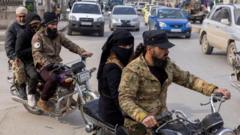As the group strives for recognition as a nationalist force, residents experience both advancements and limitations under HTS's administration. Public services such as trash collection and electricity have improved, funded by taxes from local businesses. "Idlib has a lot of things that it didn't have under the Assad regime," said Dr. Hamza Almoraweh, who notes significant development in healthcare and public utilities.
However, fears linger among various community members regarding the group’s authoritarian tendencies. While HTS has eased certain social restrictions, such as dress codes and bans on music, dissent against taxes imposed by the group has emerged, demonstrating a nuanced landscape of governance where some criticism is potentially tolerated.
The surprise replacement of the regime has prompted many displaced individuals, like activist Fuad Sayedissa, to return home for the first time in years. "People are still celebrating, but they're also worried about the future," he expressed, highlighting the hope and trepidation that marks Idlib's transformation.
In surrounding areas like the village of Quniyah, where church bells rang for the first time in a decade, there’s a sense of cautious optimism amid a legacy of hardship. Friar Fadi Azar remarked on newfound freedoms under HTS rule, allowing for a limited return of displaced villagers. Yet, despite HTS's reassurances to minorities, worries remain about the sustainability of these freedoms in a shifting political environment.
The future of governance in Syria is still uncertain, and with HTS now firmly rooted in Idlib, the extent to which it can administer effectively across the nation remains to be seen. Local communities express a desire to avoid falling under any future dictatorship—even one that emerges from within their own ranks, reinforcing the delicate balance between gratitude for stability and a yearning for true democracy.
However, fears linger among various community members regarding the group’s authoritarian tendencies. While HTS has eased certain social restrictions, such as dress codes and bans on music, dissent against taxes imposed by the group has emerged, demonstrating a nuanced landscape of governance where some criticism is potentially tolerated.
The surprise replacement of the regime has prompted many displaced individuals, like activist Fuad Sayedissa, to return home for the first time in years. "People are still celebrating, but they're also worried about the future," he expressed, highlighting the hope and trepidation that marks Idlib's transformation.
In surrounding areas like the village of Quniyah, where church bells rang for the first time in a decade, there’s a sense of cautious optimism amid a legacy of hardship. Friar Fadi Azar remarked on newfound freedoms under HTS rule, allowing for a limited return of displaced villagers. Yet, despite HTS's reassurances to minorities, worries remain about the sustainability of these freedoms in a shifting political environment.
The future of governance in Syria is still uncertain, and with HTS now firmly rooted in Idlib, the extent to which it can administer effectively across the nation remains to be seen. Local communities express a desire to avoid falling under any future dictatorship—even one that emerges from within their own ranks, reinforcing the delicate balance between gratitude for stability and a yearning for true democracy.


















